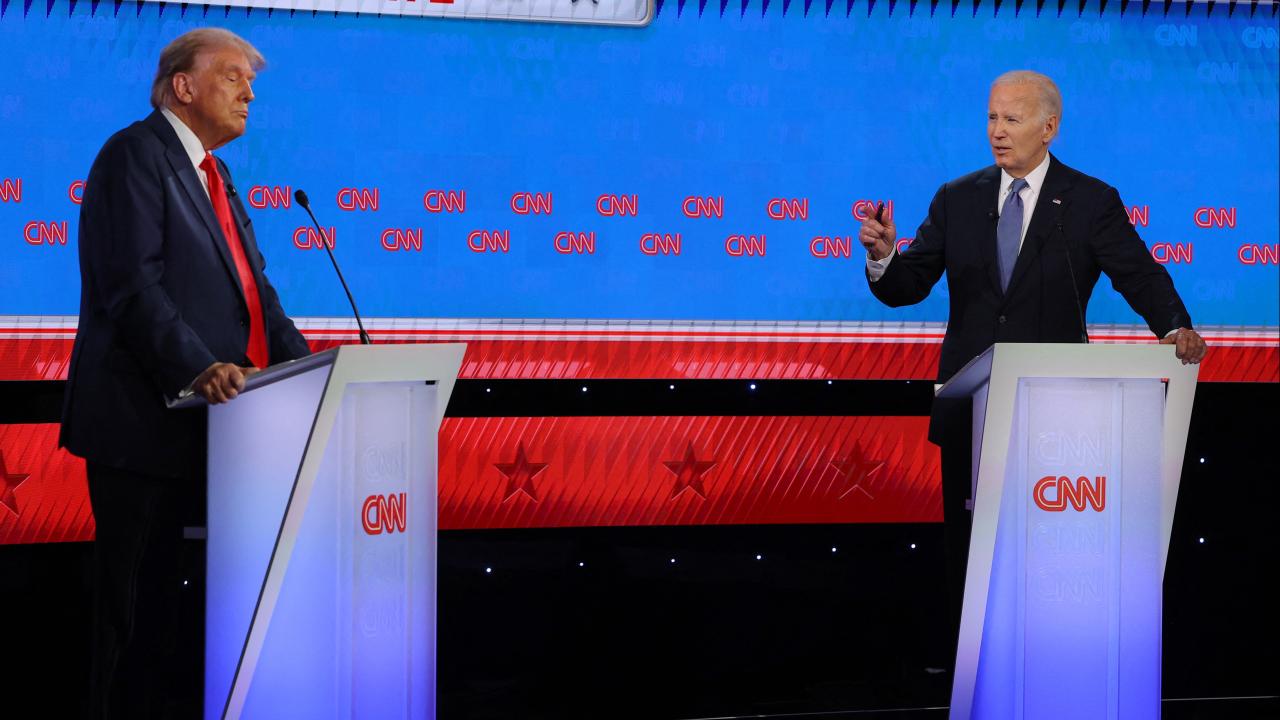
Vice President Kamala Harris, the first to acknowledge that Biden had “a slow start, that's obvious to everyone,” was an indirect winner of the US presidential debate.
Thousands of Americans gathered in bars and partisan events to watch the hottest event of the summer: the long-awaited first presidential debate between Democrat Joe Biden and Republican Donald Trump, who met for the first time in four years.
The first round of this revenge duel, however, ended with a much less tight result than those seen in 2020, with very well-defined winners and losers. Let's review what happened on this historic day.
Loser: President Joe Biden
As journalist Ian Bremmer pointed out, the United States had never seen a reaction similar to the one triggered by this reunion between Biden and Trump the day after a presidential debate. In the liberal press, total fatalism is shown regarding Biden's performance, classified as the clear loser of the night. Something never seen before, at least in these magnitudes.
With headlines like “President Biden is my friend, but he must leave the race” or “President Biden, it's time to retire,” Democratic opinion leaders showed that confidence in a victory under the current leadership is broken. Vox political correspondent Andrew Prokop sums it up nicely: “If the debate ends with your party arguing about whether you should stay in the race, it's pretty obvious you lost.” What happened?
Biden had a combination of mistakes that fueled the weaknesses his rivals most criticize. He appeared senile, lacking energy and forcefulness in his responses, which exalted the “question of age” and highlighted doubts about his ability to assume a second term with physical and mental completeness.
Winner: Donald Trump?
Of course: if one of the people in the ring loses, the other must be, by default, the winner. However, we must emphasize that Trump did not have a good victory. At least not one that should be considered overwhelming.
The Republican does not win this duel because he is impressive, but because of the very inability of a hesitant Biden to refute his cascade of lies. A disciplined and focused Republican candidate could have humiliated the president more and in a more cunning way. Biden, it should be noted again, humbled himself, without the need for Trump.
As expected, Trump lied through his teeth. He said, for example, that “inflation is killing our country,” despite the strength of the economy and employment, something that Biden never knew how to take advantage of in his positions. He also lied about the situation at the border, an issue in which his eagerness to blame Biden was evident, but in which he hid his terrible performance while in the Oval Office.
The final feeling is that Trump won the debate, but not due to merits, but rather due to the demerits of his rival.
Winner: Kamala Harris
Vice President Kamala Harris, the first to acknowledge that Biden got off to “a slow start, that's obvious to everyone,” was an indirect winner of the debate. After the terrible performance of the Democratic candidate, and given the urgency of the Party to find quick alternatives, Harris emerges as the next in line to take the reins of the campaign.
This would occur if the Democratic Party chooses to hold an open convention at the next Democratic National Convention to be held at the end of August. In this, the party delegates, who had already placed their faith in Biden, will meet to confirm the candidate who will represent them in the presidential elections. An unusual scenario could arise there: that the delegates choose to change leaders.
The rules of the Democratic convention are not as strict as the Republican ones, which discards votes against in violation of the compromised position of a delegate, as reported by El Diario. This means that delegates could offer another name as an alternative at the last minute, but this process would have to have the support of President Biden.
Democratic elites will have to speak out soon. The scenario of a change of candidate remains unlikely, but as Prokop says, it was less likely before the debate. Now it is possible.
Winner: the debate formula
Contrary to other debates in which Trump has participated, against Biden and Hillary Clinton, the rules of this debate facilitated a much looser encounter. The fluidity was notable without the interruptions of applause from the audience, absent from the scene, and without the interventions of the rival, whose microphone was closed to avoid cuts.
Loser: the moderators
If we must exalt the function of the formula, we must also criticize whoever had the task of putting it into practice. Neither Jake Tapper nor Dana Bash, the evening's moderators, took the time to correct the falsehoods told by Trump. They also didn't have the ability to get the conversation back on track when both candidates got into a fervent discussion about their golf skills...
Loser: the undecided voter
Undecided voters now know more about the golf skills between both candidates, the most passionate exchange of the night, than about their specific government plans. There was no new information about what either candidate believes in key areas. There is nothing different from what has been said in the campaign. In this sense, and with nothing new on the front, the undecided voter was left at the same starting point. The only thing new for this population group was the fear generated by Biden's abilities to govern, but when it came to policies there was no significant change.









